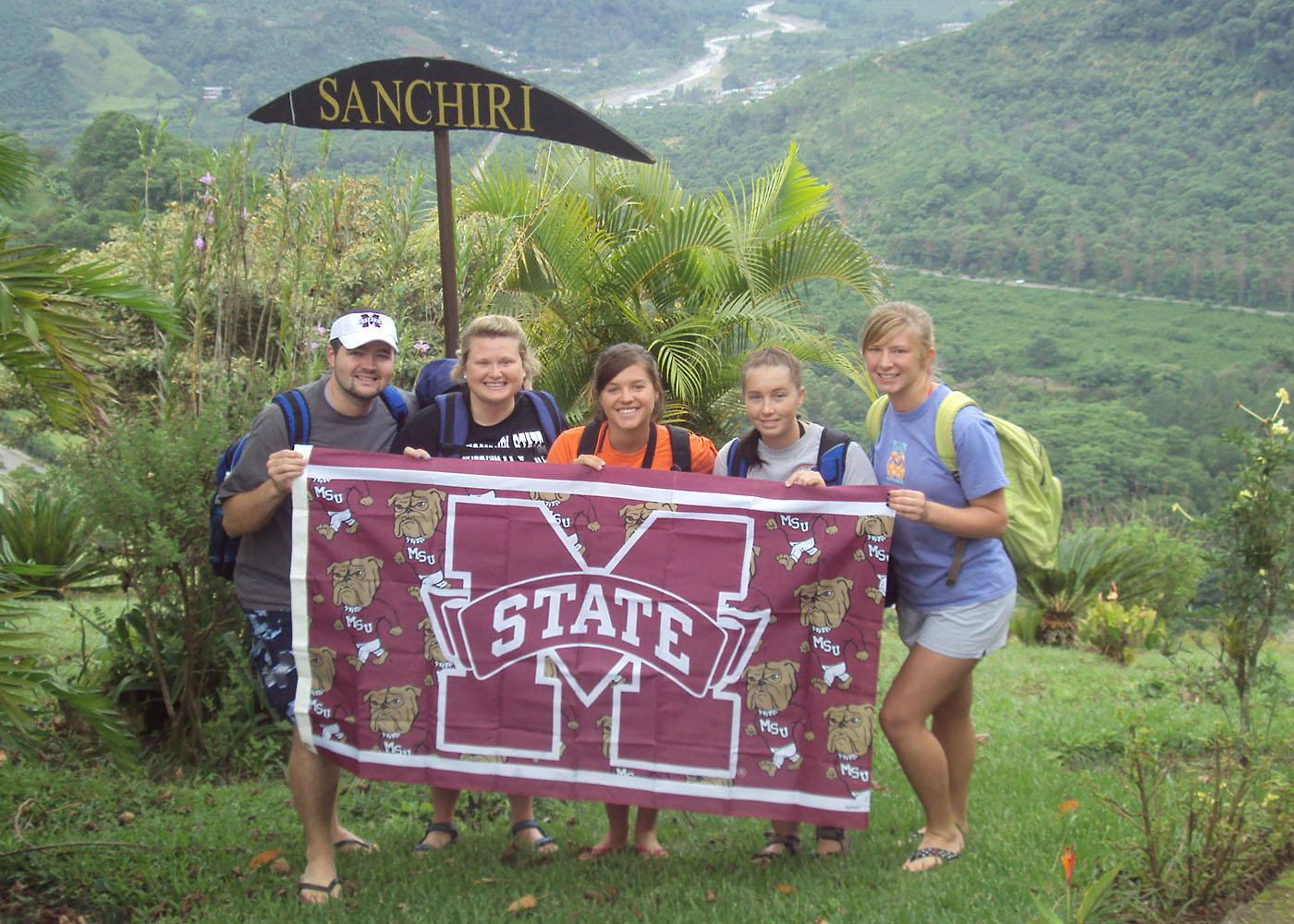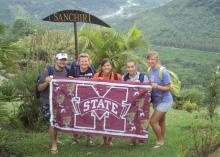Information Possibly Outdated
The information presented on this page was originally released on August 12, 2010. It may not be outdated, but please search our site for more current information. If you plan to quote or reference this information in a publication, please check with the Extension specialist or author before proceeding.
MSU vet students travel, volunteer
By Karen Templeton
MSU Ag Communications
MISSISSIPPI STATE – While many people spent their summer vacations relaxing on the beach, a group of Mississippi State University College of Veterinary Medicine students traveled to Central America to help animals in need.
In June, Katie Cooley, Brolin Evans, Brittany Fisher, Kellie Horton and Stephanie Starling, all second-year CVM students, participated in a Volunteers for Intercultural and Definitive Adventures, or VIDA, veterinary mission trip.
VIDA partners with volunteers to provide basic veterinary care, owner education, and free spay/neuter surgeries to the pets and livestock in remote and isolated communities. The VIDA veterinary program is open to all preveterinary and veterinary students and those who have an interest in animal welfare and care.
“We found out about the program through some veterinary students at the University of Pennsylvania,” said Starling, of Live Oak, Fla. “They needed some additional vet students to complete a group for their mission trip to Costa Rica and Panama. We all thought it would be a good opportunity.”
The five CVM students used personal funds and raised additional money to pay for the trip. CVM also provided some funding for the students’ travel expenses.
Dr. Robert Cooper, CVM’s associate dean and chief operating officer, helped the students procure the extra funding.
“We have a limited amount set aside that we periodically provide to students who are involved in these types of trips,” Cooper said. “We want to encourage students to stretch their wings and take advantage of learning and volunteer opportunities.”
The CVM students first traveled to Costa Rica, where they immediately started treating animals. The free clinic was held in a church, and community members lined up for free veterinary services.
“The line was out the door and down the street. Seeing how many animals needed to be treated was overwhelming,” said Evans of Cartersville, Ga. “We observed veterinarians perform spay/neuter surgeries on the first day. The next day, we were doing the surgeries ourselves. From then on, we each did about five or six surgeries a day.”
Three Costa Rican veterinarians instructed and supervised while the students performed the intake, exams, vaccinations, de-worming procedures and surgeries. In just 12 days, the student volunteers performed 93 spay/neuter surgeries and provided 163 vaccinations to cats, dogs, cows, pigs and horses.
“We are glad we got the chance to learn how to perform spay/neuter surgeries,” Starling said. “That is something we learn in our second year, so we are now a little ahead of the curve.”
The volunteers learned to provide quality veterinary care under pressure and in less than ideal conditions.
“We learned how to handle unique situations with limited resources,” Evans said. “In Panama, we were doing surgeries in extreme heat on a basketball court with people on the bleachers watching.”
The volunteers also learned about hardships faced in rural Central American communities.
“There is such a huge need for veterinary care in the villages we volunteered in, and people were so thankful for the services we offered. One woman offered me an avocado for taking care of her dog,” Evans said. “It was rewarding to be able to provide care for the animals and help those rural communities.”
Before setting out, Starling and the other student volunteers collected pet supply donations, such as leashes, collars and flea preventative, to provide pet owners during their trip.
“People there did not have the basics needed for taking care of their animals,” Starling said. “Some people were walking their dogs with shoe strings. We were glad to be able to provide them leashes.”
The experience sparked an interest in travel and international opportunities for Starling, Evans and their fellow students.
“We decided to start a chapter of the International Veterinary Students’ Association here at State,” Evans said. “Having access to the IVSA network will make it even easier for other students to find opportunities abroad.”
Starling said she will encourage other students to participate in VIDA and other international volunteer trips.
“I was a little nervous before going but am so thankful I went,” Starling said. “I hope we can help more students take similar opportunities.”
Contact: Dr. Robert Cooper, (662) 325-1135
Your Extension Experts
Related News
Pages
Related Publications
Pages
- « first
- ‹ previous
- 1
- 2
- 3
- 4




